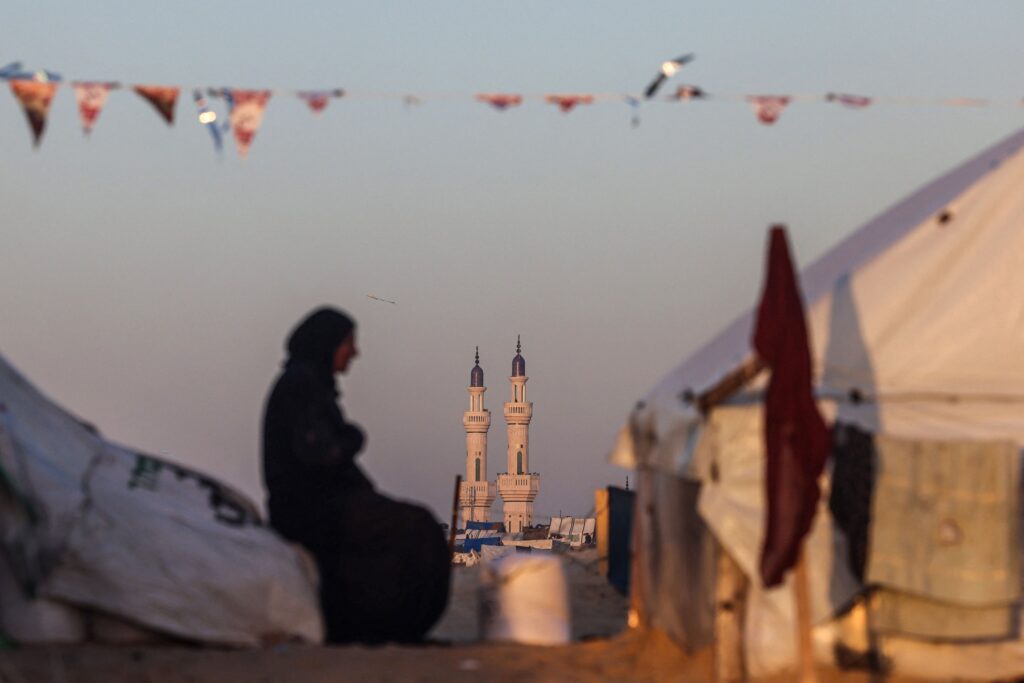
Oleh: Gracella Chafrina, Universitas Gadjah Mada
Pemenang Juara 1 Lomba Menulis Artikel Islam & Konflik Bersenjata INSANIA
In the mosaic of interpretations, Jihad often gets painted with the brush of warfare alone, yet its canvas spans a far broader landscape. It’s a tapestry woven with threads of resilience against external adversaries, internal struggles, and the whisperings of the soul’s temptations.1 Beyond the battlefield, Jihad manifests in the daily battles for self-improvement and societal harmony, embodying a spectrum of efforts aimed at nurturing growth and peace. While Western discourse often casts Jihad as a “Holy War,” Islam’s essence resonates with the harmonious chords of peace.2 Nonetheless, Islam acknowledges the somber hues of human conflict, permitting war only under the shadow of defined limits to prevent unwarranted suffering. Within this prism, the principles of Islamic humanitarian law stand as mirrors reflecting the shared objectives of the International Humanitarian Law (IHL) convention, seeking to soothe the wounds of armed conflicts and shield the vulnerable.3
In the crucible of the enduring Israel-Palestine conflict, Israel’s transgressions against fundamental IHL principles, such as the deployment of banned weapons like white phosphorus on civilian populations4, stand as stark testaments to the depths of injustice. Embedded within the ethos of Jihad lies the call for restraint and the ethical wielding of force, reminding warriors to temper their resolve with mercy even in the heat of battle.5
Against the backdrop of Ramadan, a sacred melody in the symphony of Islamic faith, the UN Security Council, fortified by its 10 non-permanent members (E-10), unveiled Resolution 2728.6 A clarion call for ceasefire throughout the holy month, it echoed the urgency to still the drums of war, release the shackles of hostages, and unfurl the banner of humanitarian aid. The adoption of Resolution 2728 emerges as a phoenix from the ashes, a testament to the collective resolve akin to Jihad, symbolizing a determined stride towards addressing a pressing crisis. It stands as a beacon amidst the storm, offering solace to the weary and a promise of redemption amidst the ruins. For countless Palestinians, this ceasefire isn’t just a ceasefire; it’s a lifeline—a testament to the transformative power of diplomatic intervention in assuaging human suffering.
Amidst a brief respite in November, Gaza’s turmoil deepened with a surge in casualties and widespread malnutrition, painting a bleak picture of the region’s plight. While the United States refrained from exercising its veto power, its support for the resolution was only lukewarm, throwing its weight behind select objectives while maintaining a cautious stance.7 The impassioned plea from Palestine’s representative underscored the anguish endured during the prolonged wait for the Council’s eventual call for a ceasefire, emphasizing the resolution’s pivotal role in upholding the sanctity of human life and dignity amidst the chaos of conflict.8
In stark contrast, Israel stood firm in its opposition, adamantly refusing to comply with the resolution and instead intensifying military operations in Gaza. High-ranking Israeli officials, including the likes of Ambassador Gilad Erdan and Foreign Minister Israel Katz, vehemently criticized the resolution, doubling down on their commitment to vanquishing Hamas and pressing forward with military action until all hostages were safely returned.9 Prime Minister Benjamin Netanyahu’s abrupt cancellation of a planned visit to the US served as a stark reminder of the escalating diplomatic tensions fuelled by the discord over the resolution.10
In the aftermath of the resolution’s passage, US officials were quick to downplay its significance, emphasizing its non-binding nature as they sought to navigate the delicate balance between extending support to Israel and acknowledging the resolution’s limitations.11 Meanwhile, China’s UN ambassador offered a dissenting opinion, asserting the binding force of such resolutions. Legal experts weighed in with their diverse interpretations, shedding light on the intricate legal terrain and the complexities of enforcing international law in the context of conflicting geopolitical interests.12 As the debate raged on, questions lingered about the efficacy of enforcement mechanisms, particularly in light of the US’s swift dismissal of the resolution’s binding nature and the absence of a unified stance among key stakeholders, as articulated by Yossi Mekelberg of Chatham House.
- Maimul Ahsan Khan, Human Rights in the Muslim World (Durham: Carolina Academic Press, 2003),133. ↩︎
- Harfiyah Abdel Haleem et al., The Crescent and the Cross, Palgrave Macmillan UK EBooks (Palgrave Macmillan, 1998), https://doi.org/10.1007/978-1-349-26440-7. ↩︎
- Anisseh Van Engeland, “The Differences and Similarities between International Humanitarian Law and Islamic Humanitarian Law: Is There Ground for Reconciliation?1,” Journal of Islamic Law and Culture 10, no. 1 (April 2008): 81–99, https://doi.org/10.1080/15288170701878300. ↩︎
- International Law Blog, “Has Israel Violated International Human Rights Law as an ‘Occupying Power’?,” International Law Blog, February 9, 2024, https://internationallaw.blog/2024/02/09/has-israel-violated-international-human-rights-law-as-an-occupying-power/#:~:text=The%20UN%20chief%2C%20Antonio%20Guterres. ↩︎
- Mohamed Abdallah Draz, “Le droit international public et l’islam (International Public Law and Islam)” (5 Revue Egyptienne du Droit International,1949), 197. ↩︎
- United Nations Security Council, “Resolution 2728,” March 25, 2024, https://documents.un.org/doc/undoc/gen/n24/080/81/pdf/n2408081.pdf?token=t1oWpv5O0kSNAkek8C&fe=true. ↩︎
- Nadeen Ebrahim and Abbas Al Lawati, “The US Allowed a Gaza Ceasefire Resolution to Pass at the UN. That Mean for the War?,” CNN, March 26, 2024, https://edition.cnn.com/2024/03/26/middleeast/israel-gaza-ceasefire-un-resolution-war-impact intl/index.html. ↩︎
- United Nations, “Gaza: Security Council Passes Resolution Demanding ‘an Immediate Ceasefire’ during Ramadan | UN News,” news.un.org, March 25, 2024, https://news.un.org/en/story/2024/03/1147931#:~:text=The%20UN%20Security%20Council%20on. ↩︎
- Claire Mom, “Israel: We Won’t Abide by UN Security Council Ceasefire Resolution on Gaza,” The Cable, Gaza March 25, 2024, https://www.thecable.ng/israel-we-wont-abide-by-un-security-council-ceasefire-resolution/. ↩︎
- Richard Roth Diamond Ivana Kottasová, Jeremy, “Israel Cancels Washington Visit after US Allows UN Ceasefire Resolution to Pass,” CNN, March 25, 2024, https://edition.cnn.com/2024/03/25/middleeast/un-security-council-gaza-israel-ceasefire-intl/index.html. ↩︎
- Jacob Magid, “UN Security Council Adopts Call for Gaza Ceasefire, Hostage Release as US Abstains,” The Times of Israel, March 25, 2024, https://www.timesofisrael.com/un-security-council-adopts-call-for-gaza-ceasefire-hostage-release-as-us-abstains/. ↩︎
- United Nations, “Security Council Demands Immediate Ceasefire in Gaza for Month of Ramadan, Adopting Resolution 2728 (2024) with 14 Members Voting in Favour, United States Abstaining | Meetings Coverage and Press Releases,” 2024, https://press.un.org/en/2024/sc15641.doc.htm. ↩︎
Disclaimer: Pandangan yang disampaikan dalam artikel ini sepenuhnya merupakan pandangan pribadi penulis dan tidak mewakili pandangan resmi Asosiasi INSANIA APIHHI.
